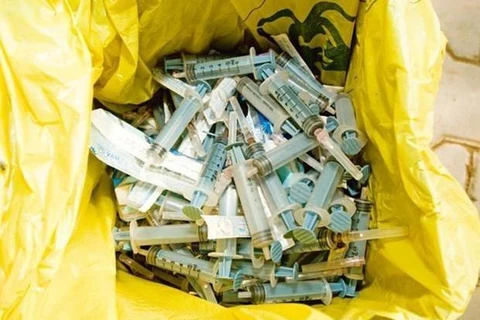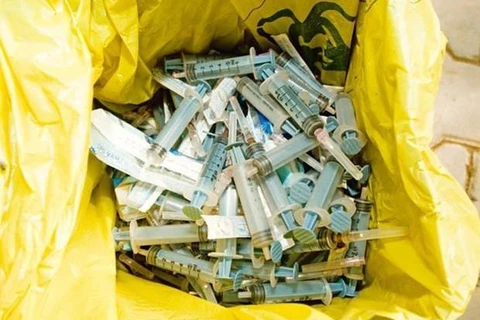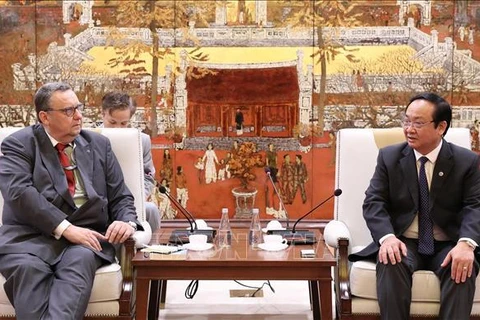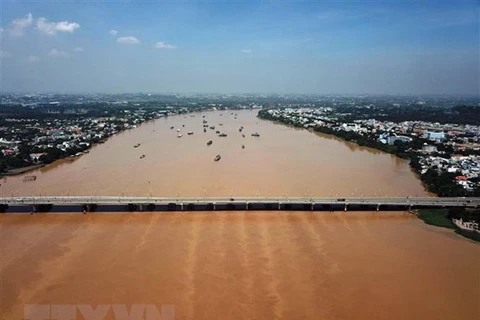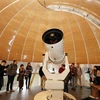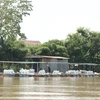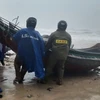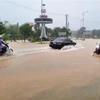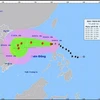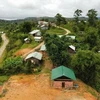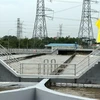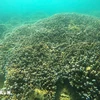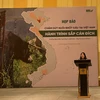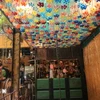Hanoi (VNA) – The collection and treatment of medical waste in COVID-19 hotbeds and quarantine areas have been conducted in line with the Ministry of Health’s standards, thus making sure that cross transmission will not happen in the community.
In recent days, along with social distancing and support to people in quarantine areas, the gathering and treatment of waste have been carried out strictly to ensure safety right in pandemic-hit and quarantine areas.
Mobilising resources for thorough collection, treatment of waste
Three months since the COVID-19 pandemic spread to Vietnam, the number of infection cases in the country has mounted to over 240. The increase in the number of patients and quarantined people has gone along with the rise in the amount of medical waste, especially dangerous waste.
However, so far, the collection of medical waste in COVID-19 hotbeds and quarantine areas has been implemented by environmental sanitation agencies following the Health Ministry-approved process.
According to a representative of the Urban Environment Company (URENCO), the firm has mobilised its resources for cleaning the environment aroundcheckpoints in all entry roads to Hanoi.
The company has installed 60 mobile toilets in 30 places and six checkpoints, while cleaning the environment in these locations.
Every day, the company’s workers in protective outfits collect waste in all checkpoints for treatment.
At the same time, the company’s units URENCO 13 and URENCO 10 have applied strict process of handing over and receiving, transporting and treating hazardous medical waste, especially those from quarantine facilities.
 Trucks transporting waste are sterilized before leaving quarantine areas and entering waste treatment plants (Photo: VietnamPlus)
Trucks transporting waste are sterilized before leaving quarantine areas and entering waste treatment plants (Photo: VietnamPlus) Vu Van Ha, Director of URENCO 13 said that since the first COVID-19 case was recorded in the community, the process of handing over and receiving as well as transporting and treating of waste collected in health care facilities have been implemented carefully in line with the guidelines of the Ministry of Natural Resources and Environment and the Ministry of Health, ensuring safety for workers.
Workers always spray disinfection chemicals before collecting waste. They are equipped with single-use protective clothes when carrying waste to collection vehicles. Chloramin B solution is sprayed many times before the waste is put into special-use trucks to hazardous medical waste plants.
Meanwhile, all vehicles for transportation of waste have been sterilized before leaving quarantine facilities and entering waste treatment plants.
Classification for “clean waste”
Ha said that the unit has coordinated with the Hanoi Department of Health and its customers to classify waste right in the original places, ensuring that waste from daily activities is not mixed with medical waste.
She said that about 150-200kg of medical waste are collected in each quarantine area each day, adding that in the COVID-19 hotbed of Bach Mai Hospital, the company has collected waste two to three times per day.
She said that two current major methods of treating medical waste are steaming and burning.
She noted that workers in URENCO 13 have experienced many epidemics such as SARS and H5N1, so that they have been ready for COVID-19.
The process of handing over and receiving waste has been conducted carefully to ensure safety for workers (Photo: VietnamPlus).
Preventing virus from spreading
For hotels, the Ministry of Health has issued Decision 1462/QD-BYT guiding the quarantine in hotels for medical staff engaging in COVID-19 prevention and control. The quarantine duration depends on the real situation, but not less than 14 days.
The hotels must be located in a convenient position for travelling and transporting of quarantined people as well as logistics activities and waste collection.
Yellow trash bins with the label of “hazardous waste may contain the novel coronavirus SARS-CoV-2” have been placed in exit and entry of quarantine areas, rooms for quarantined people and rooms for staff.
Nearly 150 hotels and resorts in the country have volunteered to housethe quarantined. Most recently, MuongThanh Grand Xa La in Ha Dong district, Hanoi has been allowed to accommodate medical staff of Bach Mai Hospital.
At the same time, the Ministry of Health has asked provinces and cities across the nation to drastically implement waste sorting, collecting, transporting and treating, especially wastewater, ensuring that COVID-19 infection source is not released to the environment.
The local Departments of Natural Resources and Environment and Health have been urged to provide financial resources to health care and quarantine facilities for waste classification, collection, transportation and treatment.
On April 1, the Ministry of Natural Resources and Environment submitted a proposal to the Government asking for support in protective equipment for medical staff and workers in hospitals and quarantine areas as well as for the enhancement of capacity in treating hazardous medical waste./.

